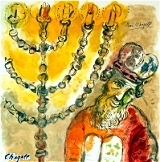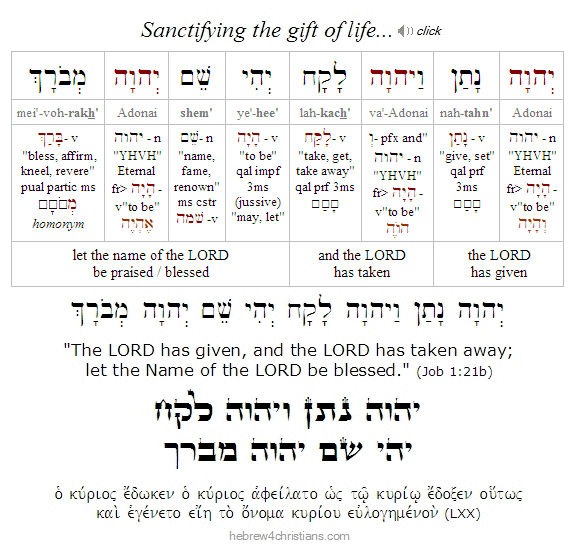|
In our Torah reading for this week, parashat Shemini (שמיני), we read of a great tragedy that occurred on the very day that Israel was to celebrate the dedication of the Mishkan, or the portable sanctuary in the desert. When Aaron's sons Nadab and Abihu brought unauthorized incense into the Holy of Holies, they died on the spot at the hand of God. When Moses explained to Aaron that the death of his sons revealed the sanctity of God, Aaron said nothing: "he remained silent" (Lev. 10:3). The fire that killed Aaron's sons had wounded him profoundly as well.
The sages struggled to understand what happened here, some arguing that the transgression was so serious that death was the righteous punishment, while others admitted they did not understand God's severe response. In general, however the sages were distraught over the incident, and their confusion was compounded over Aaron's silence over the sudden death of his sons. Some midrashim say that Aaron cried and wailed and then fell silent, though the Torah simply says וַיִּדֹּם אַהֲרֹן - "and Aaron was silent."
Aaron's silence reminds me of Ludwig Wittgenstein's adage: "Whereof one cannot speak, thereof one must be silent," and it is likely there were no words that could express the shock of his loss... Indeed trauma often leaves people dumbstruck and overwhelmed in an ineffable flood of cascading emotions. The pain may so great to even transport the person into another "place," a place of detachment, of incommunicable loneliness and grief.
Aaron was silent... Was it the overwhelming pain of his loss that rendered him speechless, or did his emptiness sanctify him, bringing his soul before the Consuming Fire in immolation? We do not know. For most of us, the shock of trauma leaves us with a "speechless cry" that echoes within our sorrowing silence. Our pain expresses fear that since every relationship is fragile and may suddenly end without warning, everything we love will be lost to us, and this dread leaves us speechless, longing for undying love, and crying out for life.
What can we say in the face of our tragic losses in this life? Worldly wisdom sighs, "Things happen; there's no explanation. It's best to get over it and move on." Godly wisdom denies we live in a random world devoid of God's presence and purposes. Aaron's silence expressed his acceptance of the Divine decree. We say Kaddish, we defer to God's sovereign will and praise His Name as the one who in wisdom both gives and takes away. We may be left in the silence of grief for a season, but we remain before God in our bereavement and keep hope that one day all our fears will forever be gone, and that all things will be made new...
Hebrew Lesson
Job 1:21b reading (click):
<< Return
|



